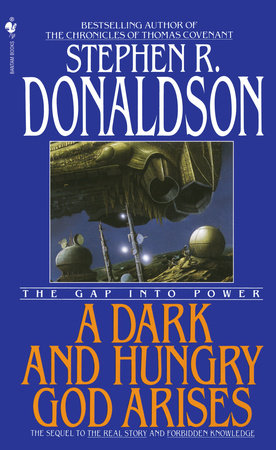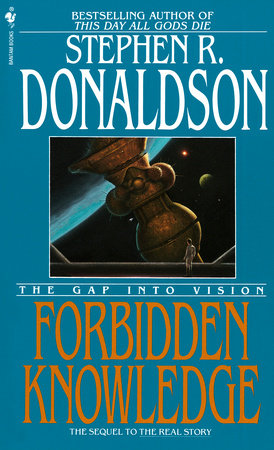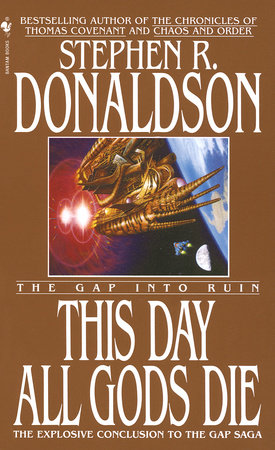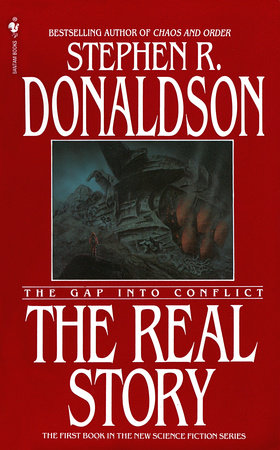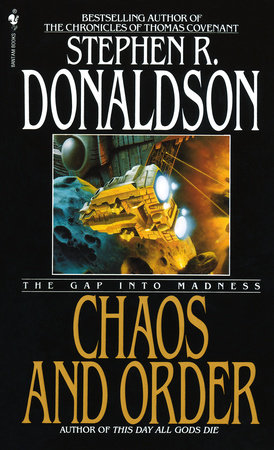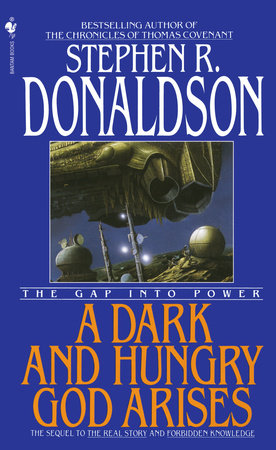Excerpt
A Dark and Hungry God Arises
HOLT
Shortly before Angus Thermopyle and Milos Taverner left UMCPHQ aboard Trumpet, Holt Fasner visited his mother.
He did this despite the fact that the old harridan had been in a foul temper for decades.
The medical advances which had kept him nearly healthy, relatively strong, almost in his prime, for a hundred fifty years had come too late to be comparably effective for her. In fact, they would have failed her thirty years ago if he hadn’t insisted on plugging her into machines which first pumped blood, then digested food, and eventually breathed for her. She was technically still alive, of course; but now she was only the husk of a woman. Her skin was the blotchy color of rotting linen; she could hardly move her hands; she hadn’t lifted her head from its supports for at least ten years. She no longer knew the difference when tubes brought her sustenance or carried away waste.
She retained her mind, however. Bitter as a vial of acid, Norna Fasner continued to think long after her body lost its last capacity to do anything.
That was why her son kept her alive. Many years ago she’d given up asking him to let her die. She knew from old, painful experience that he would put her off with a bland chuckle and a vacuous remark: “You know I can’t do without you, Mother.” And shortly afterward she would find yet another video screen installed in the room which she considered her tomb.
She studied the screens, even though she hated them. Their images were all she had to think about. If they were switched off, her brain would almost surely go null; and she didn’t want that. She desired death, not unconsciousness. If even one of her screens had gone blank, she might have wept in frustration and grief. Every image, every word, every passing implication was a hint which might eventually enable her to believe that her son would be destroyed. Without hints—without the possibility that she would receive hints—all her years of paralyzed, unliving existence would come to nothing.
Her son was the United Mining Companies CEO; unquestionably the richest and beyond doubt the most powerful man alive. From his corporate “home office,” his station orbiting Earth half a million kilometers beyond UMCPHQ, he ruled his vast empire: the largest, arguably the most necessary enterprise in human history. His employees were counted in millions: men and women who lived or died by his decisions and policies, in billions. Disguised by the UMC charter, and by the public democracy of the Governing Council for Earth and Space—which was nominally responsible for controlling men like him, corporations like his—he raised and toppled governments, destroyed or enriched competitors, caused potential futures to take on substance or fray away like mist. Behind his back, people who feared him sometimes referred to him as “the Dragon”—and only people who had no idea who he was didn’t fear him.
He stood at the nexus of human dealings with forbidden space. All human access to that imponderable source of wealth passed through his hands. And humanity’s only defense against that imponderable threat belonged to him.
The value of Holt Fasner’s time couldn’t be measured in pure cesium. Nevertheless he visited his mother whenever an opportunity presented itself. He treasured her advice too much to let her die.
Although he was sometimes hard-pressed to interpret it. Her wish for his ruin was so palpable that he had to be extraordinarily careful in how he sifted her insights, what valence he assigned to her pronouncements. As a result, his encounters with her were a challenge which he found profoundly stimulating.
In truth, he could almost certainly have afforded to let her die any time during the past half century. He liked talking to his mother; he profited from her advice. But he could have done without it. He kept Norna Fasner alive precisely because she wished him ill with such steady virulence; also because he took pleasure in her utter helplessness; and finally because she kept him on his toes. Otherwise he was inclined to forget that he was mortal.
Men who forgot their mortality made mistakes. Holt Fasner had paid blood—not always his own—for his successes; and now that he had them, he didn’t mean to let them go glimmering in the name of a mistake.
So he visited his mother shortly before Trumpet’s departure. Risks were at work; small risks that might metastasize at any moment. In themselves, Angus Thermopyle, Milos Taverner, Nick Succorso, and Morn Hyland were nothing more than three men and a woman; pawns of Holt’s larger policies, his grander dreams. But stirred together with Billingate and the Amnion, they might conceivably produce something more volatile, with a lasting impact, like a minor thermonuclear pile which went critical and rendered all its environs uninhabitable for centuries.
The director of the United Mining Companies Police was in charge, of course; Warden Dios himself. The risk was of his choosing, not Holt’s: the negative consequences, if any, would be his to clean up. But Holt cherished the well-being of the UMCP as he cherished the health of the whole United Mining Companies. If he’d believed the risks too great, he would have forbidden them.
He hadn’t.
Nor had he dismissed the situation from his mind, however. Instead of trying to second-guess Ward—who had spent the better part of three decades proving himself as the Dragon’s strong right hand—Holt went to talk to Norna.
The room where he kept her immured was hidden in the obscure recesses of the home office, in a part of the station where no one ventured except men and women with extremely specialized authorizations. As usual when her several doctors weren’t examining her, the only illumination in her high sterile sickchamber came from the twenty or so video screens which nearly covered the wall in front of her. That dimness was her choice: the little strength left in her fingers was enough to tap buttons that would raise or lower the lights, adjust her posture, summon assistance—or even turn off the screens. Holt allowed her that freedom because he trusted the use she would make of it.
Stark and garish in the phosphor gleam, her face looked like that of a mummy painted to appear ghastly under UV lamps. Incessantly her thin lips and toothless gums chewed food she hadn’t tasted for decades. At intervals she drooled unselfconsciously; a fretwork of wrinkles spread the saliva into a sheen across her chin. She didn’t glance at her son as he entered: her eyes flicked restlessly across the screens as if she could absorb and understand them all simultaneously.
From them came a steady mutter of voices and soundtracks, a muted and indistinguishable argument interleaved with at least half a dozen kinds of music—a noise like a rabble, uneasy and irate; but so blurred and distant that it might have been the tectonic grumbling of rocks, or the lost complaint of the sea. The sound alone set Holt’s teeth on edge: at times it seemed to muddle his brain. It made him think there was something structurally wrong with the home office itself.
He knew from experience, however, that Norna absorbed and understood the voices as well as the images.
“Hello, Mother,” he greeted her—artificially hearty, in part as a matter of policy, in part because he had to do something to counteract the effects of the noise. “You’re looking well, better than ever. I do believe you’ll be able to get out of bed soon. I can certainly use your help running the company. How are you feeling? What do the doctors say?”
She met his blather with her usual disregard. The way her eyes hunted the screens made him think of a chicken trying to peck seeds out of stony soil.
He scanned the screens himself for a moment, but their images offered him nothing. The typical collection: half a dozen news broadcasts, all trying to reinterpret life for their viewers, all reaching the same conclusions; three or four sports programs showing acts of extreme violence in varying degrees of simulation; four or five comedies and satires which gave the impression that they all repeated the same jokes over and over again; and half a dozen romantic videos—“Mother, really, at your age, aren’t you ashamed?”— reveling in the kind of mindless and supernal lust which had apparently driven Morn Hyland and Nick Succorso together on Com-Mine Station. With such tripe masses of human beings were tranquilized—until those rare occasions when they woke up, saw what was really happening around them, misunderstood it, and did their best to impose the stupidest possible solution on the men who normally led them. The Humanity Riots were a case in point. The rest of the time, the world reflecting from the screens served its purpose efficiently enough. But it had nothing to give Holt himself.
For the umpteenth time, he wondered what it gave his mother. Did she see in it something that he missed? Was she simply hoping for news that some disaster had befallen him? Or was she able to snatch a secret knowledge out of the gabble—knowledge which had somehow eluded him, despite his vast resources?
The question added piquancy to his visits with her.
What could he have missed? Not much, obviously, since he’d demonstrated his ability to profit—and profit hugely—from those times when the human billions kicked over the traces and demanded irrationality from their leaders. He still chuckled internally when he thought of the Humanity Riots. Imagine trying to face the threat of the Amnion without genetic expertise to match their own! And yet humankind’s outbreak of revulsion against genetic experimentation had effectively delivered Intertech into his hands. Owning Intertech, in turn, had given him control over first contact with the Amnion—and that had led as inexorably as a syllogism to his present position as the arbiter of fate for his whole species.
If any man in history could claim to have not missed much, Holt Fasner was the one. Nevertheless he kept the question—and his mother—alive to help him ensure that he didn’t start missing things now.


